Fiestas and Religious Events
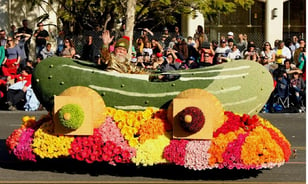

Panagbenga Festival Baguio City
Panagbenga is a local Kankana-ey term in Cordillera, which means “a season for blossoming.” Panagbenga Festival is a month-long festival in Baguio. Tourists flock to the city during this time to watch the Grand Float Parade which features giant floats in different characters made of flowers. Many celebrities also perform here. Because of this, Panagbenga has become a famous festival in the Philippines. Panagbenga Festival is also known as Flower Festival or Season of Blooming. This festival is yearly celebrated in Baguio, the summer capital of the Philippines, during the months of February and March.
This is the province’s tribute to the city’s flowers and as a way to rise up from the destruction of the Luzon’s volcanic activity on July 16, 1990. It was first celebrated in the early 90s to raise the people’s spirits after a devastating earthquake. The festival was so successful, so they brought it back the year after that, and up to now. The festival showcases different kinds of floats that are decorated with lush flowers. There are street dancing and marching bands. The dancers' costumes have flowery designs while the dance is inspired by the Bendian, an Ibaloi dance of celebration that came from the Cordillera Region. The fragrant smells of fresh flowers surround Baguio City. The celebration of the Panagbenga will help younger generations to rediscover their culture's old traditions and the essence of the festival, which is the deep-rooted love for our native Filipino heritage.
The indigenous people in the area were first wary with government-led tourism because of the threat that they will change the rituals of community. Now, these indigenous tribes are even the front runners in the Panagbenga Festival.
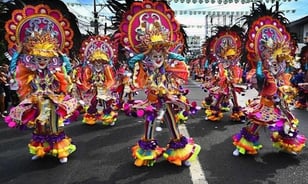

MASSKARA FESTIVAL BACOLOD CITY
The MassKara Festival has become an icon for Bacolod City, Philippines as the City of Smiles. It is considered as the happiest and most colorful festival in the Philippines. But beyond the colorful mask and lively dance, is a sad story which was a turning point in the history of Bacolod City. MassKara Festival is a very popular festival in the Philippines. MassKara is derived from the word’s “mass” meaning “many” and “kara” meaning “faces,” thus, calling it the Festival of Many Faces. Many tourists visit Bacolod in October to witness this grand Filipino cultural festival. Being known as the City of Smiles, Bacolod parades many smiling masks worn by the locals during this festival in the Philippines. The word "Masskara" is a portmanteau, coined by the late artist Ely Santiago from mass (a multitude of people) and the Spanish word cara (face),thus forming MassKara (a multitude of faces). The word is also a pun on maskara, Filipino for "mask" (itself from Spanish máscara), since it is a prominent feature of the festival and is always adorned with a smiling face, giving rise to Bacolod being called the "City of Smiles.
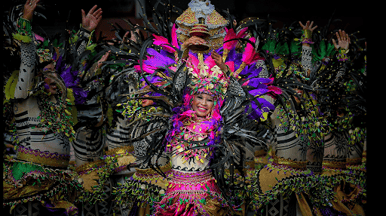

MASSKARA FESTIVAL BACOLOD CITY
The MassKara Festival has become an icon for Bacolod City, Philippines as the City of Smiles. It is considered as the happiest and most colorful festival in the Philippines. But beyond the colorful mask and lively dance, is a sad story which was a turning point in the history of Bacolod City. MassKara Festival is a very popular festival in the Philippines. MassKara is derived from the word’s “mass” meaning “many” and “kara” meaning “faces,” thus, calling it the Festival of Many Faces. Many tourists visit Bacolod in October to witness this grand Filipino cultural festival. Being known as the City of Smiles, Bacolod parades many smiling masks worn by the locals during this festival in the Philippines. The word "Masskara" is a portmanteau, coined by the late artist Ely Santiago from mass (a multitude of people) and the Spanish word cara (face),thus forming MassKara (a multitude of faces). The word is also a pun on maskara, Filipino for "mask" (itself from Spanish máscara), since it is a prominent feature of the festival and is always adorned with a smiling face, giving rise to Bacolod being called the "City of Smiles.
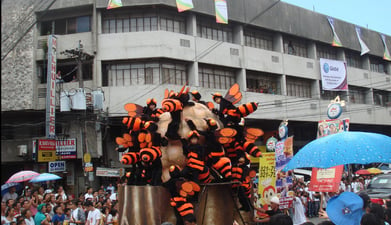

Pintados Festival Tacloban
The Pintados Festival is a cultural-religious celebration in Tacloban, Philippines, based on the body-painting traditions of the ancient tattooed "pintados" warriors.[1] In 1986, the Pintados Foundation, Inc. was formed by the people of Tacloban to organize this festival in honor of Sr. Santo Niño.[2] Years later, it was merged with the Kasadyaan Festival which is always held on June 29.[3]
"Pinados," or "piatos people," is a term that refers to the native Filipinos who Spanish colonizers encountered in the 16th century.[4] Centuries of Spanish occupation affected Filipino culture and much of the history surrounding tribal tattoos is concentrated on the Visayan (including the people of Tacloban) and Igorot peoples.[4] Due to their relative isolation, ethnic groups such as the Ifugao have resisted Spanish cooptation more so than others in the Philippines.[5]
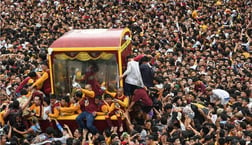

Black Nazarene Statue
